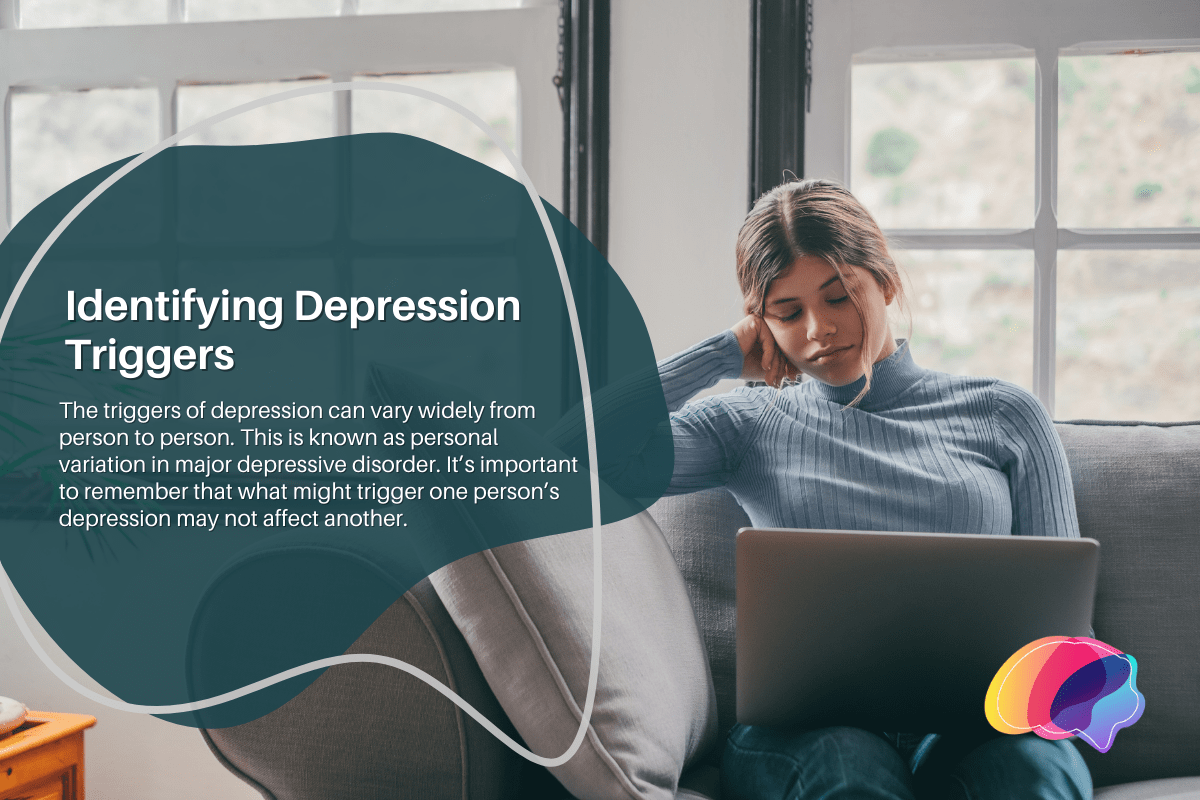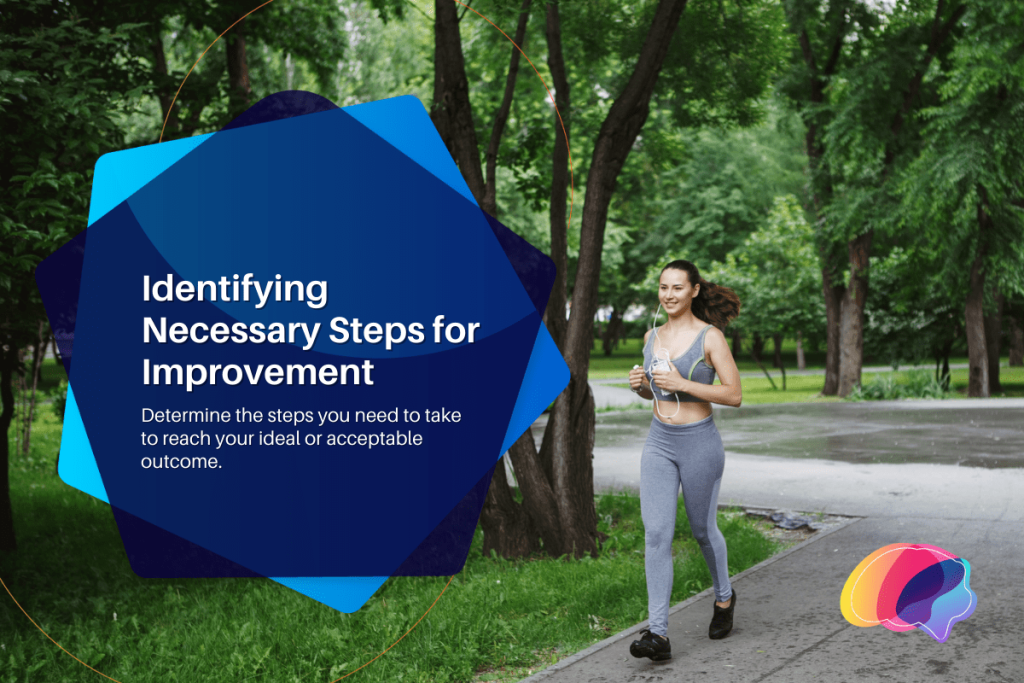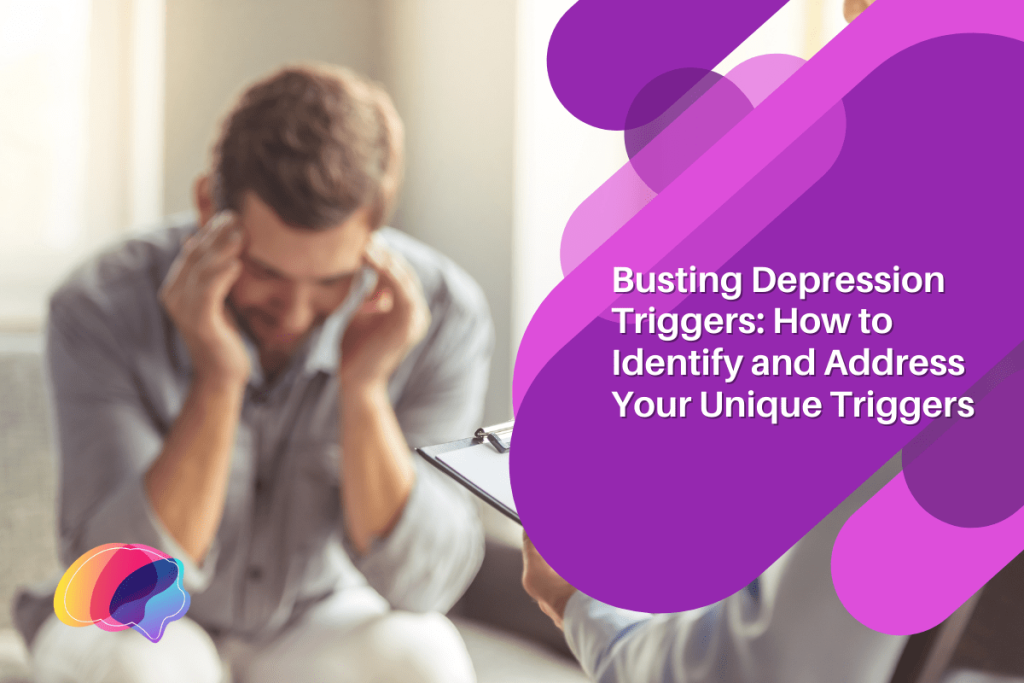Depression is a serious mental health disorder that can be disabling if left untreated. While it’s common to experience depression in response to certain events or circumstances, many people don’t realize that there are often more subtle triggers at work.
A trigger is a thought, feeling, situation, or environmental factor that can affect your mood and behavior.
Identifying and addressing these triggers is an important step in managing depression. When you know your triggers, you can take measures to prevent them from overwhelming you and causing your depression symptoms to worsen.
Let’s explore some common things that trigger depression and strategies for managing them.
Identifying Depression Triggers
The triggers of depression can vary widely from person to person. This is known as personal variation in major depressive disorder. It’s important to remember that what might trigger one person’s depression may not affect another.
To identify your unique triggers for mental illness, it can be helpful to keep a diary and record any changes in mood or behavior when certain events occur or environmental factors change. This will help you to look for patterns that point toward possible causes of depression.
In addition to personal variation, there are some common triggers of a depressive episode that may affect different people. These include:
Stressful life events: Experiencing a traumatic event or significant loss can be very difficult mentally and emotionally.
Hormonal changes: Hormones play a significant role in regulating mood, and shifts in hormones can cause depression.
Chronic illness or pain: An ongoing medical condition can be painful and exhausting, which may cause depression.
Lack of sleep: Insomnia or poor quality sleep can harm mood and well-being.
Dietary changes: Poor nutrition or sudden major dietary changes can lead to depressive symptoms.
These triggers are common with people with mental health disorders such as postpartum depression, seasonal affective disorder, major depressive disorder, and other depressive episodes.

Evaluating Coping Mechanisms
Self-reflection is an important part of evaluating the effectiveness of your coping mechanisms for depression and other mental health disorders. If you’re relying on a particular strategy to manage depression, taking the time and care to reflect on its effects on your mental health and overall well-being is essential.
Consider how often you’ve used this strategy if it was effective in managing triggers or alleviating symptoms, and what, if any, side effects have resulted from its use. Taking a moment to assess your coping strategies and determine which ones are most successful in alleviating symptoms can be extremely helpful in managing depression and anxiety.
Identifying Effective Coping Strategies
Just as important as self-reflection is to evaluating coping mechanisms in mental disorders, it’s also essential to identify which strategies are most effective for managing depression and anxiety. Generally speaking, the best coping strategies for managing depression focus on addressing the root causes of your symptoms and developing healthy, positive behaviors that can reduce their presence in your life.
This may include finding ways to relax or practice mindfulness, developing healthy sleep habits, participating in physical activity or exercise, and engaging in meaningful activities that bring joy and purpose to your life.
Exploring different approaches to managing depression through therapy or medication can also be incredibly effective. Talking about your triggers with a therapist or doctor can help identify triggers in your environment, while seeking professional treatment can provide long-term relief from depression and anxiety.
This helps you manage your mental health symptoms and prevents you from turning to substance abuse when developing depression. Investing in healthy coping strategies and actively working to manage depression can make a significant difference in your mood and well-being.

Recognizing Ineffective Coping Strategies
In addition to identifying effective coping strategies, it’s important to recognize when certain strategies may not provide you with the promised relief. In some cases, relying on unhelpful or unhealthy behaviors as a form of coping can make depression and anxiety worse.
This includes engaging in addictive behavior such as substance use or excessive drinking, using food as a means of coping, or engaging in self-destructive behavior like punching walls or cutting.
One such example is isolation vs. seeking support. While isolating yourself from friends and family may ease feelings of stress and sadness, it’s important to remember that connecting with others is essential to managing depression. Rather than withdrawing from the people around you, stay connected to those who provide comfort and support. It’s essential to build a support network for yourself when depressed.
Visualizing Ideal Responses
It can be challenging for those with depression to recognize potential triggers, but being able to do so is an essential aspect of managing depression. Visualizing the ideal responses to your triggers can be an effective way of overcoming them.
To start, take some time to identify all potential triggers that could affect you. Once you’ve identified them, write down the ideal response or action for each. Here’s what to do:
Envisioning Best-Case Scenarios
Begin by picturing the best-case scenario for each trigger. Visualize what it would look like if you could respond healthily. For example, if your trigger is always overwhelmed by tasks, imagine how great it would be to break down those tasks into smaller manageable chunks and complete them one at a time rather than trying to tackle everything all at once.
Considering Acceptable Outcomes
Next, identify the acceptable outcomes for each trigger. Think about what would be a reasonable response, even if it’s not your ideal one. For example, in the same situation of being overwhelmed by tasks, an acceptable outcome might be taking a break for 15 minutes and returning to work with renewed focus and energy.
Identifying Necessary Steps for Improvement
Finally, determine the steps you need to take to reach your ideal or acceptable outcome. Making a plan of action can help you stay on track and achieve your goals. Continuing with the same example, this might mean setting a timer for 15 minutes and doing something calming (e.g., going for a walk or listening to music).

Developing a Trigger Management Plan
Developing a trigger management plan is an important step in managing depression. This plan should involve understanding and identifying common triggers, such as stress and changes in routine or relationships, and developing coping strategies to cope with these situations. Identifying potential triggers can help you develop strategies to reduce the chances of them occurring – or at least limit their effects on your mood.
Components of the Plan
An effective trigger management plan includes education about depression, developing coping skills, recognizing and managing triggers, and seeking social support.
Educating yourself about depression will help you better understand the condition and how it affects your moods. You can also learn about available treatments and develop self-management strategies to cope with symptoms.
Seeking Professional Help
Professional intervention and support are needed to develop an effective trigger management plan. A therapist or other mental health professional can help you identify, understand, and manage triggers. They can also provide you with important coping strategies to help you better manage symptoms of depression.
Practicing Self-Care
It’s important to practice self-care and develop healthy habits that can help you manage stress. Self-care activities such as eating a balanced diet, exercising regularly, and getting adequate sleep can help reduce the effects of depression triggers. Additionally, engaging in activities like mindfulness and meditation can help you better cope with difficult emotions.

Tailoring the Plan to Personal Needs
It would be best to manage the trigger management plan to your needs. This includes understanding how depression affects you and what coping mechanisms best fit your lifestyle. A therapist can work with you to develop a plan that meets your specific needs.
Practicing Mindfulness and Coping
Mindfulness and coping strategies can be important tools in managing depression. Mindfulness is the practice of becoming aware of one’s thoughts and feelings without judging them, which allows someone to respond compassionately rather than reacting impulsively or too emotionally.
Practicing mindfulness techniques such as deep breathing, guided imagery, body scans, self-reflection activities, and other mindful activities can help reduce the effects of depression.
Coping strategies are also effective when managing depression. Examples of coping strategies include maintaining a positive attitude, engaging in self-care activities such as exercise, getting enough rest and nutrition, and connecting with friends and family.
Other coping techniques might include positive self-talk, journaling, problem-solving, or challenging negative thoughts. These strategies can help a person remain grounded and focused on the present moment, which can be beneficial in managing depression.
By focusing on following healthy lifestyle habits, reducing stress levels, and practicing mindfulness and coping strategies, one can reduce the impact of depression in one’s life. Taking action to prioritize mental health is an important step towards living with depression.
Tips to Avoid Depression Triggers
While it’s not always possible to completely avoid depression triggers, you can take steps to minimize their impact and build resilience. Here are some tips to help you avoid or cope with depression triggers:
Know Your Triggers: Recognize situations or thoughts that make you feel down or stressed.
Talk to Supportive People: Share your feelings with friends and family who listen and care.
Stay Active: Move your body regularly through exercise or simple activities like walking.
Eat Well: Choose a balanced diet with plenty of fruits, vegetables, and whole grains.
Sleep Enough: Aim for a regular sleep schedule and get the rest you need.
Limit Alcohol and Drugs: Avoid using substances that can worsen your mood.
Relax: Learn relaxation techniques like deep breathing to manage stress.
Set Realistic Goals: Break tasks into small steps and celebrate achievements.
Understanding the Ongoing Process
When dealing with depression triggers, it’s important to realize that it’s an ongoing process that requires attention and active management. It can be easy to become overwhelmed by the emotions associated with depression, and it’s important to remember that these feelings will pass in time.
It’s also necessary to understand that certain triggers may reoccur throughout your life, and it’s important to remain mindful of these potential triggers before they have a chance to manifest themselves. This may require actively looking for them in your environment, such as reflecting on situations that have upset you and considering how to handle them best when they occur again.
Get Depression Treatment at Lucid Wellness Center
At Lucid Wellness Center, we provide comprehensive depression treatment to help our patients identify and manage their triggers. Our team of experienced professionals is committed to providing personalized care that can be tailored to fit each individual’s needs.
We understand everyone experiences depression differently, and our goal is to ensure that all our patients get the support they need to cope with their unique triggers.
Lucid Wellness Center offers numerous treatments for depression, including cognitive-behavioral therapy, medication management, and lifestyle guidance. We can also work with family members to provide support and understanding to create a safe space for healing.
Don’t wait to find relief and lasting improvement in your well-being. Schedule a free initial consultation with our board-certified psychiatrist today and embark on a journey toward a more fulfilling life with TMS therapy. Call us at (323) 792-2071 or [email protected] to learn more.
Frequently Asked Questions About Identifying and Addressing Depression Triggers
What Are the Triggers for People with Depression?
Depression triggers can vary from person to person. Common triggers include stress, changes in routine or environment, traumatic events, and certain medications. Those with depression need to be aware of common sources of stress and take steps to reduce their exposure to them.
What Are Some Coping Strategies to Help People Who Suffer from Depression?
There is no one-size-fits-all approach to dealing with depression triggers, but several strategies may be helpful. Developing a healthy lifestyle, including eating a balanced diet and regular exercise, can help improve symptoms of depression. Managing stress by practicing relaxation techniques like deep breathing or mindfulness can also reduce the impact of depression triggers. Additionally, it can be helpful to connect with a mental health professional who can provide additional resources and support.
How to Identify and Address Your Depression Triggers?
The first step in addressing your depression triggers is to identify them. Make a list of the possible sources of stress that may be triggering your symptoms, such as changes in routine, certain medications, or other events. Once you have identified potential triggers, you can take steps to reduce their impact on your mental health. This may involve developing healthier coping strategies and avoiding or minimizing exposure to certain triggers. Additionally, it can be helpful to connect with a mental health professional who can provide additional resources and support.
How Can I be Mindful of My Depression Triggers and Take Steps to Manage Them?
The most effective way to manage depression triggers is to be aware of your patterns and recognize when you feel overwhelmed or distressed. Taking steps like deep breathing or mindfulness can help reduce the severity of symptoms. Additionally, it’s important to be mindful of possible sources of stress and take steps to limit their impact. This may mean avoiding certain activities or situations that can trigger negative emotions or finding ways to modify them to be less of a strain. A mental health professional can provide additional guidance on being mindful of your triggers and taking proactive steps to manage them.
What Lifestyle Changes Can I Make to Address My Depression Triggers?
Making lifestyle changes can be a powerful way to manage depression triggers. Eating a balanced diet, getting enough exercise and sleep, managing stress through relaxation techniques, and connecting with others are all important steps in managing your mental health. Additionally, taking time each day to relax and reflect on what makes you feel good can be helpful. Taking steps to reduce your exposure to common sources of stress can help you better manage depression triggers.
How Can I Develop a Plan to Address My Depression Triggers?
Developing a plan to address your depression triggers can be an effective way to manage them. List potential stress sources and note any patterns or triggers you identify. Next, develop strategies for reducing the impact of these triggers. This may include lifestyle changes like eating a balanced diet, exercising regularly, and managing stress through relaxation techniques.
Sources:
Algorani EB, Gupta V. Coping Mechanisms. [Updated 2023 Apr 24]. In: StatPearls [Internet]. Treasure Island (FL): StatPearls Publishing; 2023 Jan-. Available from: https://www.ncbi.nlm.nih.gov/books/NBK559031/
Bains N, Abdijadid S. Major Depressive Disorder. [Updated 2023 Apr 10]. In: StatPearls [Internet]. Treasure Island (FL): StatPearls Publishing; 2023 Jan-. Available from: https://www.ncbi.nlm.nih.gov/books/NBK559078/
Chand SP, Arif H. Depression. [Updated 2023 Jul 17]. In: StatPearls [Internet]. Treasure Island (FL): StatPearls Publishing; 2023 Jan-. Available from: https://www.ncbi.nlm.nih.gov/books/NBK430847/
Brigitta B. (2002). Pathophysiology of depression and mechanisms of treatment.Dialogues in clinical neuroscience, 4(1), 7–20. https://doi.org/10.31887/DCNS.2002.4.1/bbondy
Melrose S. (2015). Seasonal Affective Disorder: An Overview of Assessment and Treatment Approaches.Depression research and treatment, 2015, 178564. https://doi.org/10.1155/2015/178564
Soares, C. N., & Zitek, B. (2008). Reproductive hormone sensitivity and risk for depression across the female life cycle: a continuum of vulnerability?. Journal of psychiatry & neuroscience : JPN, 33(4), 331–343.
Mughal S, Azhar Y, Siddiqui W. Postpartum Depression. [Updated 2022 Oct 7]. In: StatPearls [Internet]. Treasure Island (FL): StatPearls Publishing; 2023 Jan-. Available from: https://www.ncbi.nlm.nih.gov/books/NBK519070/


